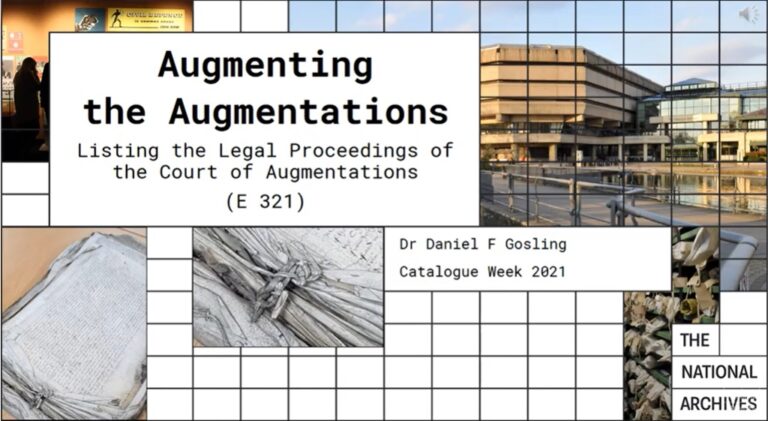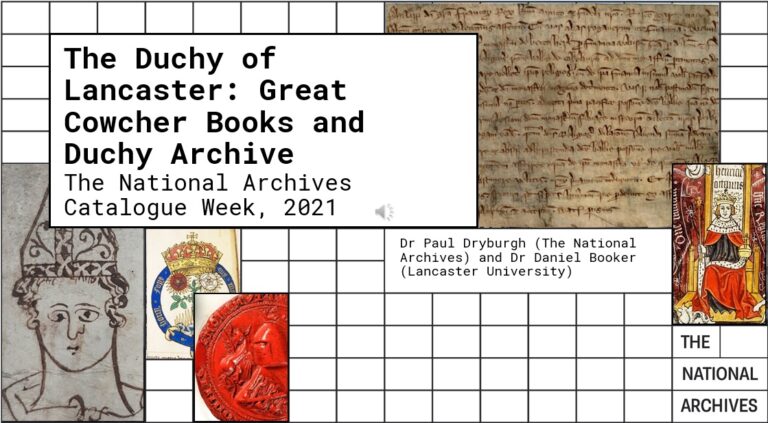Traditionally, the final week of November marks our annual Catalogue Day event here at The National Archives. This year we are hosting the event online for the second year running and are extending the programme to run over a week rather than a single day, with additional content available than in previous years.
Over the next five days we will be releasing 17 recorded presentations and blog posts to mark our 21st year of this popular event. As in previous years, content will provide an update on a number of current or recently completed cataloguing projects, in addition to updates on other initiatives and processes taking place across the office.
Content released today focuses on records from the medieval and early modern period. Dan Gosling discusses the legal proceedings of the Court of Augmentations, while volunteer Kaylara Reed co-authors a blog alongside Sean Cunningham on cataloguing Exchequer warrants from the Wars of the Roses. Our final presentation is a joint effort from Paul Dryburgh and Lancaster University’s Dr Daniel Brooker, covering the Cowcher Books and medieval archives of the Duchy of Lancaster.
Tuesday’s focus shifts to all things technical, as Faith Lawrence and Alex Green provide an update on Project Omega, The National Archives’ future cataloguing system. Related to this is a blog entry from Faith, Alex and our external UX colleague Paul Vetch (Torchbox), covering the evolution of PROCAT in terms of designing a new editorial system. Julius Welby’s blog focuses on the The National Archives’ contribution to the Archives Portal Europe Project, an ambitious undertaking bringing together data from over 7,000 European archival institutions.
Philippa Hellawell will be discussing the letter books of the Royal African Company during the period 1672-1750 in her presentation on Wednesday, while volunteer Patricia Ainley and The National Archives’ Bruno Pappalardo provide a blog post highlighting the connection between those enslaved at Cape Coast Castle in 1796 to the Royal Navy Captains’ letters of the Napoleonic Wars project. The day also features an overview of cataloguing 19th-century artwork and advertising with Katherine Howells and a presentation focusing on the cataloguing of Railway Accident Registers with Chris Heather.
Our penultimate day shifts to the First and Second World Wars. Laura Robson-Mainwaring discusses cataloguing First World War medical diaries, while Michael McGrady looks at the challenges presented by abbreviations and identification in cataloguing Second World War diaries. James Cronan continues the Second World War theme focusing on civilian honours, and our final blog release for the day highlights the case of Leonard Orpin, a British civilian interned during war time.
Finally, our three presentations on the last day of Catalogue Week include a study of offensive terminology in archival descriptions, as Grace Van Mourik provides an overview of language in The National Archives’ catalogue, and an overview from Beth Astridge on the importance of cataloguing grants for the wider archival sector. Amanda Bevan will focus on the Prize Papers in her presentation ‘Sorting (out) the Prize Papers’.
With increased content available for users in this extended event, we hope that there is something to meet all interests. I would like to extend my thanks to all the contributors who made this weekly celebration of our cataloguing projects and initiatives possible. Colleagues from across the office and our many fantastic volunteers make this event possible, and hope that all of our readers enjoy the presentation and blog entries made available.
Jane Langford (Senior Archivist, Catalogue, Taxonomy and Data Team)
Augmenting the Augmentations: Listing the legal proceedings of the Court of Augmentations (E 321)
In his presentation ‘Augmenting the Augmentations’, Dr Dan Gosling, Principal Legal Records Specialist at The National Archives, tells us about his work on the project listing the legal proceedings of the Court of Augmentations in series E 321.

Spending Power: Cataloguing Exchequer warrants from the Wars of the Roses
In late medieval England the monarch’s money was collected, stored and spent by officials within offices resembling modern departments of state: the Exchequer, Wardrobe or Chamber. The oldest and most complex of these, the Exchequer, managed national income and spending, acting as a strongroom for treasure, a court for financial matters, a place of audit and an archive. When kings wanted to spend large sums of money, they had to send instructions to the Exchequer as warrants written under the privy or signet seals. These are found in series E 404 between 1154 and 1837.
This cataloguing project, presented for Catalogue Week by Kaylara Reed and Sean Cunningham, focuses on a small part of the sequence: E 404 files for Edward IV’s reign (1461-83). Continuing work by the Richard III Society on the records for Richard’s reign (1483-85), it expands the content to the period of the Wars of the Roses.
The Duchy of Lancaster: Great Cowcher books and Duchy Archive
In their presentation, Paul Dryburgh and Daniel Booker tell us about the medieval archive of the Duchy of Lancaster – perhaps the largest private archive in the country – and two projects aiming to make it better known and far more accessible to as many people as possible.
